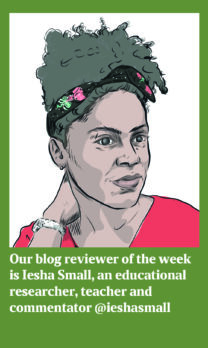Our blog reviewer of the week is Iesha Small, an educational researcher, teacher and commentator
@debrakidd
I didn’t ever think I’d be reviewing a blog about letting children go to the toilet, but life surprises you sometimes. Debra Kidd is firmly of the view that children should be allowed to go to the toilet during lessons, but seems to have been challenged by other teachers who see it is an erosion of order and authority. To her detractors, Debra writes: “I would argue that in our role as teachers and safeguarders of children, our first duty is to do no harm.”
Sometimes I come across situations that I honestly hadn’t given much thought to until I realised how much they appeared to matter to other people. This is one of those things. In schools I’ve taught in, the expectation is that children go to the toilet during break and lunch, though they can go during a lesson at the teacher’s discretion. My current school has a page at the back of the pupil planner that we sign, time and date so it’s clear that pupils have permission to be out of lessons and, if necessary, we can notice any patterns. It seems to work well.
Getting research into policy: The role of think-tanks
@lkmco
I entered teaching via the Teach First scheme, and a few weeks ago I was asked to speak at a participant conference in Peterborough. It was for current teachers who were deciding what to do next. At these kinds of events there are always a few people who say they would like to work in policy or for a think-tank, but when you probe further they don’t entirely know what that involves. Loic Menzies set up the LKMco educational think-tank (where I work part-time) accidentally about 10 years ago and this blog helpfully explains what think-tanks do and how they can affect the educational landscape.
“The role of think-tanks is not just to describe what should happen in an ideal world, but to propose applicable steps that will move the system towards it,” it reads. If you work in schools or care about education you should read this to find out how think-tanks work to affect policy. Some of Michael Gove’s most influential reforms started off as ideas in papers written by Policy Exchange, for example.
Why aren’t children reading in schools?
@bcb567
Barbara Band is a school librarian, and in this post she explores the key factors that turn children into readers. “Creating readers is a long-term mission; there isn’t a simple formula that can be applied and it will not happen overnight,” she writes.
She outlines the importance of teachers, the school ethos, a good librarian and the students themselves, while she also touches on the impact of the home environment. There is an interesting point about many teachers lacking of knowledge of young adult books; I have recently read Noughts of Crosses by Mallory Blackman and realized that good young adult books are as gripping and well-constructed as books aimed at older adult audiences.
Doing a PGCE with a chronic health condition – an experience and some advice
@chevalier_cygne
Sometimes I don’t realise how ignorant I am about certain topics until I read about them, and this blog was one of those times. As somebody who is able-bodied and generally healthy, I’d never given any thought to how somebody training as a teacher would be affected by a chronic health condition. I know that my training year was fairly intense – and I was in full health. Mel is an SEN teacher who outlines her experience of doing a PGCE with a chronic health condition and offers advice for others in a similar situation: “If we can find institutions that will back us we are doing a great thing by being there.”













Your thoughts